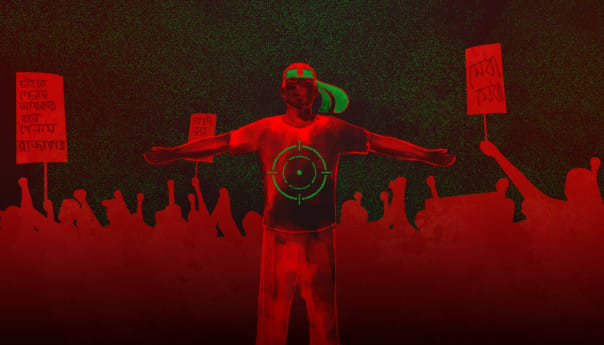Quota reform resurgence: Stop violence against students

The quota reform protest started in 2018 but was abruptly dissolved through harsh and cunning methods. Now, it has resurfaced due to the indecisiveness of the government. The movement has been joined by numerous students across the country both from private and public universities, indicating that the protest is close to people's hearts, and they find the demands logical.
In the past couple of years, no other protest has been able to mobilise so many students. The reason behind such huge participation is that many students go through the bitter experience of not finding the jobs they deserve, after completing their education. In addition, rampant corruption and irregularities in government job recruitment exams and selection processes have created immense frustration and anger among graduates and students.
Actually, this young generation has become victims of jobless growth and plunder in the process of development! The country's economy shows growth, but jobs are not being created. Meanwhile, there are hundreds of thousands of job vacancies in the public sector particularly in the education (schools, colleges, universities) and health sectors such as hospitals. The total uncertainty in getting jobs as well as the absence of a development plan that will create employment opportunities created frustration and anger among students. As a result, many students are trying to leave the country. Those who cannot go abroad, or do not want to leave the country l, are particularly affected by the negative prospects of finding a proper job. They are the primary participants of the movement.
Currently, BCS is the most secure and sought-after job opportunity in the country. However, due to the current quota structure in the BCS exam, a significant portion of students feel deprived. They believe that talent and intelligence are not being properly valued.
Because of issues like quota structure, question leaks, favouritism in appointments, and corruption, many job opportunities are being lost unethically and illegally. To resolve these issues, and prevent them from recurring, students are joining the protests, hoping to create a collective voice to challenge this scenario to some extent.
In response, the government has not shown a sensitive or logical reaction. When the protests were ongoing in 2018, the government completely removed the quotas, which was not what the protesters demanded. The demand was for quota reform, to bring it to a logical and acceptable structure. The fact that over 50 percent of jobs were being allocated based on quotas was not acceptable. The complete removal of quotas harmed those who actually needed them, such as minority groups and differently-abled individuals.
Understandably the government's decision to remove quotas altogether has been deemed illegal by the high court, sparking the current protest. The movement has spread from Dhaka to all divisions in the country, drawing participation from university and college students of various institutions. The students' demand is for the government to take necessary action to reform the quotas.
The government's stance is that the matter is now a legal proceeding in the courts, and therefore, it cannot play a role, as stated by the Prime Minister recently. However, the full ruling of the High Court in this regard stated that if the government wants, it can bring changes to the quota system. Thus, the claim that the government has no role to play is misinformation.
If the government had decided to form a committee to understand what the students want, find the logic behind their demands, ensure that those who need the quotas are protected, and figure out how reform could be brought about, there would not have been any issues. The students had a simple demand: for the government to listen to them based on an educated demand for necessary change. Instead, the government took a hostile route, spreading unnecessary negative remarks about the protesters and provoking them with wordplay. Even the Prime Minister's comments were derogatory and provocative against them.
After that, the Bangladesh Chhatra League (BCL) started attacking the protesters violently day and night. The police charged at protesters with batons and tear gas. The BCL even attacked students seeking medical help at Dhaka Medical College Hospital. Six people have already been killed. This demonstrates the government's autocratic and rigid mentality about public demand to solve a national problem. This is a sad and unacceptable situation.
Our experience shows that every time citizens raise their voices to demand their rights or to protest any wrongdoings, whether they are teachers from schools, colleges, universities, labour groups, or students, the government responds with rigidity and violence. It spreads misinformation and makes unnecessary provocation, and if none of this works, it unleashes the police or ruling party hooligans to disperse the movements. This has been happening for years. Even teenage students, who demanded safe roads, were not spared!
The government's mentality and approach send the message that ordinary citizens do not have the right to protest or the right to voice their needs. The government can do whatever it pleases, and it must be accepted by everyone. Anyone who tries to take any different position will face heavy consequences. To sustain this autocratic behaviour, the ruling party's student wing and police forces, funded by taxpayers' money, are used as weapons.
The government is complicating and antagonising a solvable proposition by ordinary citizens. The students are not trying to steal anything, deprive anyone of their rights, engage in corruption, or take away opportunities from others. Their only ask is that meritorious students get their deserved opportunity to succeed. When these students are attacked, bloodily injured, sent to hospitals, or killed for demanding that educational qualifications be valued, it is an attack on the whole country.
So as citizens, we are bleeding too. We therefore demand that the government stop attacks on students, change its stance, listen to the students' demands, and create an operational system to address the issues brought forward by the protesters.
Anu Muhammad is former professor of economics at Jahangirnagar University.
Views expressed in this article are the author's own.
Follow The Daily Star Opinion on Facebook for the latest opinions, commentaries and analyses by experts and professionals. To contribute your article or letter to The Daily Star Opinion, see our guidelines for submission.




 For all latest news, follow The Daily Star's Google News channel.
For all latest news, follow The Daily Star's Google News channel. 


Comments